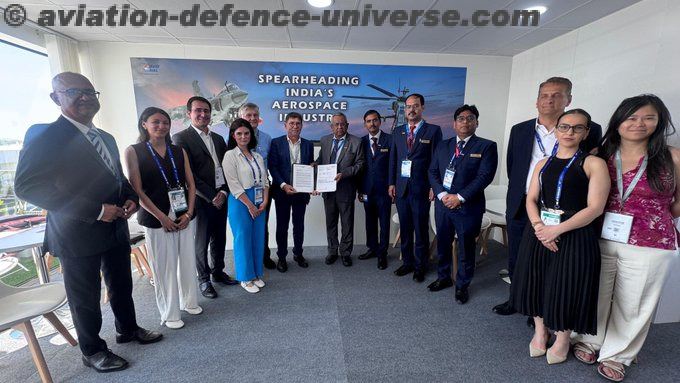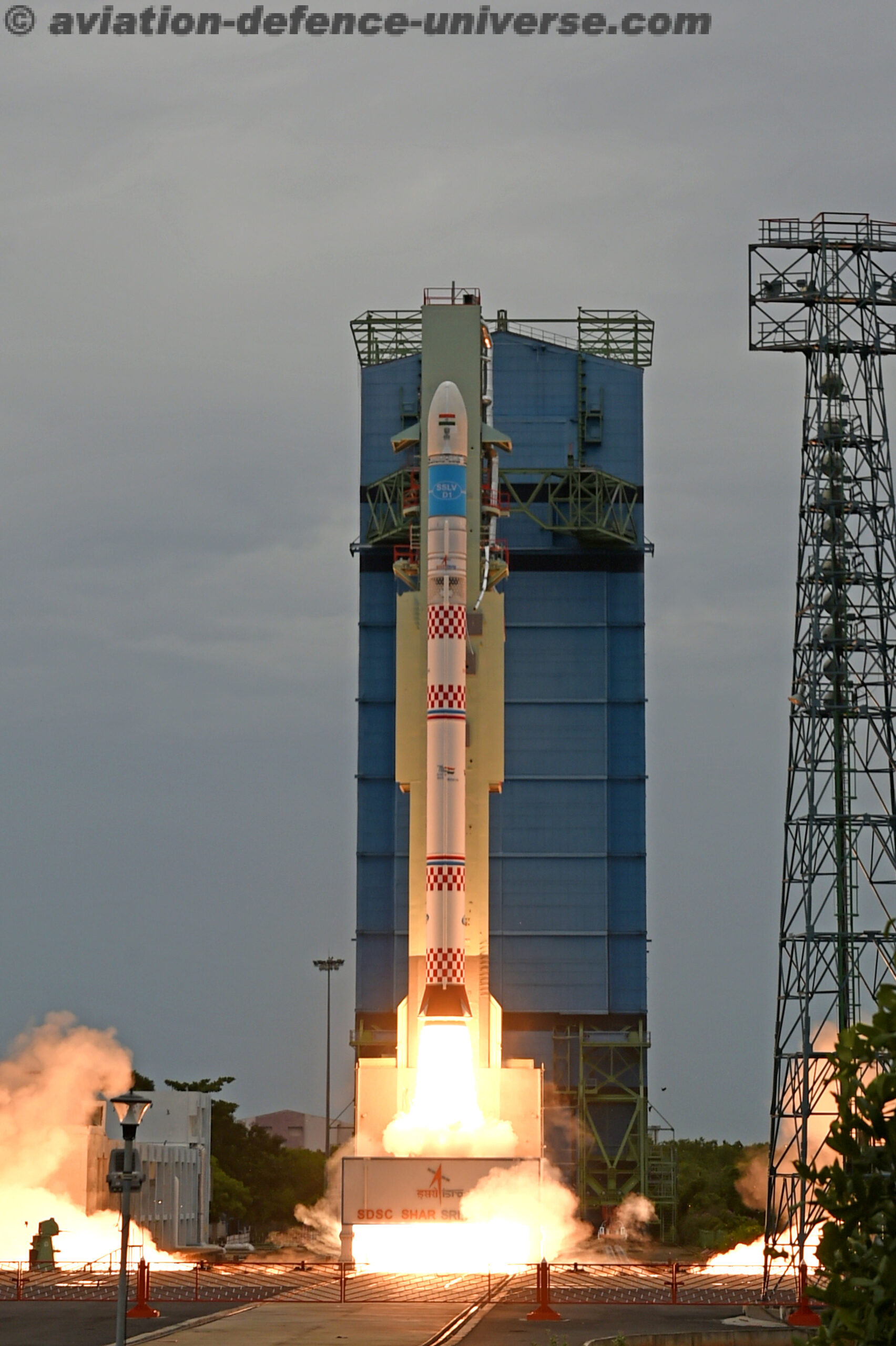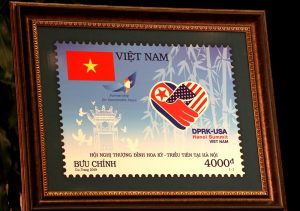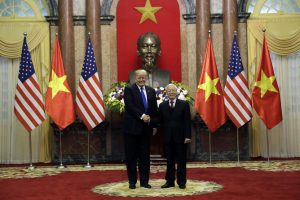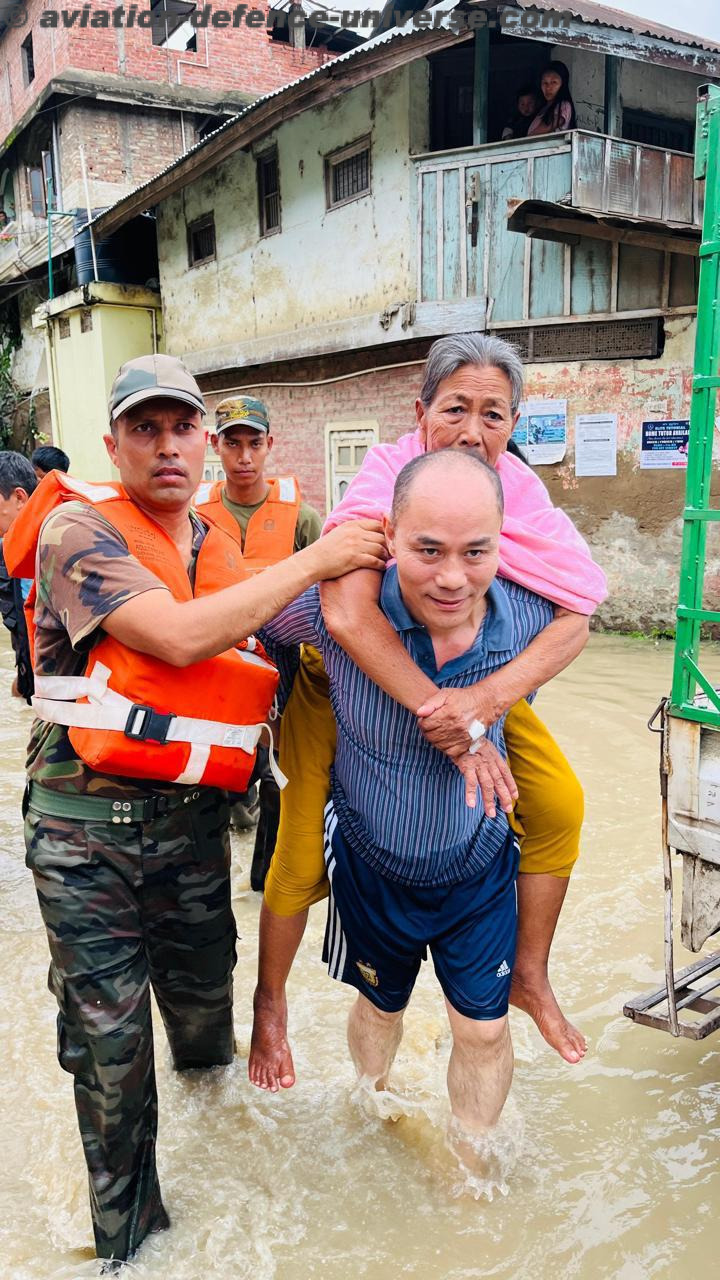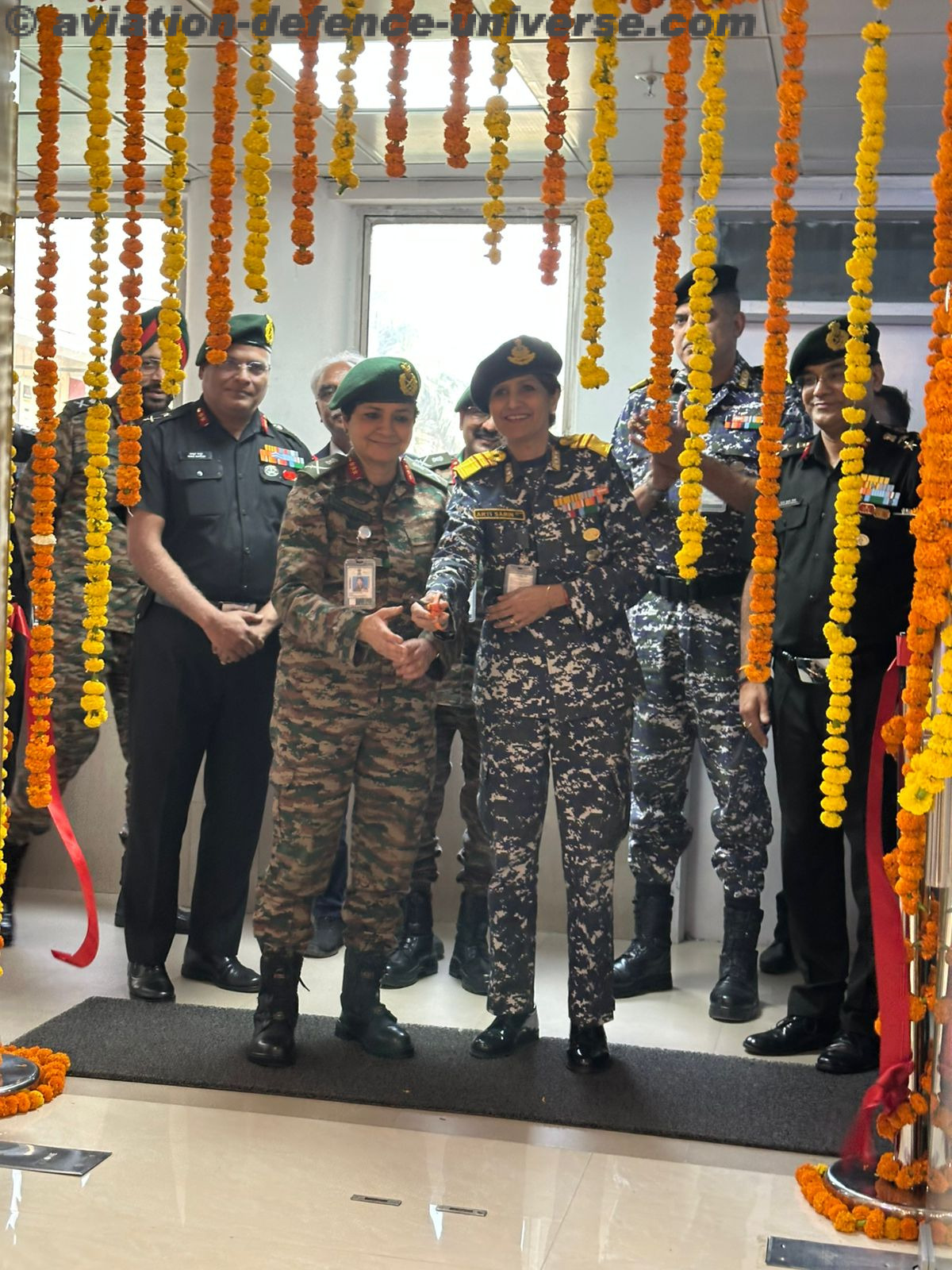Special Briefing Peninsula Hotel
Manila, Philippines
February 28, 2019
SENIOR STATE DEPARTMENT OFFICIAL: Okay, so on background, as the President said in his press conference, he had an excellent set of talks with Kim Jong-un. They were productive, they were constructive, and we made progress in a number of areas between the two sides. It was worth the time to have the two leaders together. During the course of the discussions, the North Koreans made clear that any future steps on denuclearization would require the lifting of sanctions. As the President said in his press conference, the North Koreans basically asked for the lifting of all sanctions.
Now, Ri Yong-ho, the foreign minister of North Korea, clarified their position overnight in a press conference, and I just want to clarify what he was saying. The – what the North Koreans asked, and what they have been asking for several weeks in our working-level negotiations, is the lifting of the United Nations Security Council sanctions imposed since March of 2016.
QUESTION: All of them?
SENIOR STATE DEPARTMENT OFFICIAL: I’ll clarify that. In the course of those discussions, they qualified their ask by saying that they wanted the sanctions lifted, that, as they said – as Ri Yong-ho said in his press conference last night – sanctions that impede the civilian economy and people’s livelihood among them. We culled through the sanctions and we asked the North Koreans during the working-level negotiation for a definition of what that included, and if you review the UN Security Council resolutions you’ll see that includes – the sanctions themselves include a broad range of products, including metals, raw materials, transportation, seafood, coal exports, refined petroleum imports, raw petroleum imports. We asked the North Koreans to clarify for us what they meant by these – this – their qualification, and it was basically all the sanctions except for armaments.
QUESTION: Except for what?
SENIOR STATE DEPARTMENT OFFICIAL: Armaments, weapons – except for weapons.
And so we went through that and we did our own calculation, and it tallies up to the tune of many, many billions of dollars. We have —
QUESTION: When did they make the demand? During the working-level talks?
SENIOR STATE DEPARTMENT OFFICIAL: They first surfaced this request during the working-level negotiations in the week leading up to the summit, and we evaluated it closely and explained to them that that wouldn’t work. What they had offered in return was the dismantlement of the Yongbyon nuclear complex, but Yongbyon nuclear complex is also a important entity to define, because the Yongbyon complex since the early 1990s has been at the center of the North Korean nuclear weapons program and it involves many institutions, buildings, outbuildings. It’s a substantial set of facilities on a single property and it’s important to be very precise about that, and the North Koreans struggled to give us a precise definition of what that was.
Leaving aside those process questions that are still very much in discussion between the two sides, I want to say that the dilemma that we were confronted with is that the North Koreans at this point are unwilling to impose a complete freeze on their weapons of mass destruction programs, so to give many, many billions of dollars in sanctions relief would in effect put us in a position of subsidizing the ongoing development of weapons of mass destruction in North Korea. Now, they didn’t ask us to do that, but that is effectively the choice that we were presented with.
The President in his discussions challenged the North Koreans to go bigger. The President encouraged Chairman Kim to go all in, and we were going to go – we were prepared to go all in as well, and that’s where we are. So the good news is it was very constructive discussions. We’re not – we’re not shy about saying that, and it is absolutely true. And we ended on a very good note between the two sides. We just couldn’t get there on the agreement at this point but within the discussions on this agreement we got to a level of detail that has eluded us for quite a while, certainly since the Singapore joint statement, including things like what is the definition of the Yongbyon nuclear complex, which is a very important issue for us as we look to disassemble the entire weapons of mass destruction program in North Korea.
So we’re in an okay place. We didn’t get a deal because the deal wasn’t there to be had, but we are prepared to continue talking. I was very reassured to see the official press release from the North Koreans this morning that they’re actually taking the exact same tone that President Trump took in his press conference yesterday. They were constructive discussions. There’s room to continue talking. The two leaders have a personal relationship that both of them believe will yield benefits for the development of our plans here, and for my part – well, I shouldn’t say this because I’m on background, but let me just say the United States very much looks forward to engaging further with the North Koreans as soon as they’re prepared.
QUESTION: So you don’t —
QUESTION: The North Korean foreign minister said that they were prepared to get rid of their plutonium-producing facilities at Yongbyon and/or HEU facilities in the presence of UN inspectors. Is that an accurate description of what they offered? That’s what they said publicly.
SENIOR STATE DEPARTMENT OFFICIAL: That is what they have discussed with us, and that is actually what they first raised in September – on September 19th of 2018 in the joint statement between Chairman Kim and President Moon Jae-in after their summit in Pyongyang. It’s not a new offer. It is only part of the Yongbyon nuclear complex. It’s —
QUESTION: What part is not included?
SENIOR STATE DEPARTMENT OFFICIAL: Some of that I can’t discuss.
QUESTION: The tritium?
SENIOR STATE DEPARTMENT OFFICIAL: I can’t discuss all the parts of it, but the Yongbyon nuclear complex is a sprawling, three-square-mile site.
QUESTION: The light water reactor?
SENIOR STATE DEPARTMENT OFFICIAL: It’s a sprawling, three-square-mile site with more than 300 different, separate facilities located on it, all of which are dedicated to supporting the nuclear weapons program of North Korea.
QUESTION: Are they looking to keep open a civilian nuclear energy production option?
SENIOR STATE DEPARTMENT OFFICIAL: They —
MODERATOR: Can you talk about that, or – all right.
SENIOR STATE DEPARTMENT OFFICIAL: Yeah. Yeah, yeah. We’re in the middle of negotiations on a number of issues, but we are not negotiating the civilian nuclear energy capability.
QUESTION: Can I ask —
QUESTION: We know that you want to shut down —
QUESTION: [Senior State Department Official], I’m Nick Wadhams with Bloomberg. Two questions. One, are you any closer to a shared definition of what denuclearization means? And then also, in your Stanford speech, you referenced Yongbyon but then also these other plutonium enrichment facilities beyond Yongbyon.
SENIOR STATE DEPARTMENT OFFICIAL: Uranium.
QUESTION: Sorry?
SENIOR STATE DEPARTMENT OFFICIAL: Uranium.
QUESTION: Sorry, uranium. Well, plutonium, and – you said “destruction of North Korea’s plutonium and uranium enrichment facilities. This complex… extends beyond Yongbyon.”
SENIOR STATE DEPARTMENT OFFICIAL: Okay.
QUESTION: So were they – were those other facilities also on the table? Or were they offering to —
SENIOR STATE DEPARTMENT OFFICIAL: What the North Koreans proposed to us was closing down a portion of the Yongbyon complex.
QUESTION: So only Yongbyon? And then how about on denuclearization? Are you any closer to a shared definition?
SENIOR STATE DEPARTMENT OFFICIAL: On the definition of denuclearization, it’s a matter that we discussed at length in the working-level negotiations, but it wasn’t in the North Korean proposal yesterday.
QUESTION: What does that —
SENIOR STATE DEPARTMENT OFFICIAL: They haven’t agreed to it.
QUESTION: [Senior State Department Official], who else was in the working-level talks in the week leading up to the summit other than Kim Yong-chol? Did they have – was —
SENIOR STATE DEPARTMENT OFFICIAL: They have a delegation, about five people, representing the ministry of foreign affairs, what they would call the Asia Pacific Peace Commission, and the State Affairs Commission, which is effectively the – would be the equivalent of the White House. State Affairs Commission are the people who work directly for Chairman Kim in their structure. On our side, we had a delegation of 16 experts, including international law experts, nuclear fuel cycle experts, missile experts, trade sanctions experts, economists. We were prepared to evaluate any proposal that they put forward, and we did so with great seriousness, and I want to say we welcomed their proposals, Gus, but we didn’t have a deal that the President could agree to at this point.
QUESTION: When – sorry – were there any considerations for making smaller incremental agreements at this summit, like liaison or IAEA inspectors as a stepping stone and an example of goodwill and further trust building, or it’s basically all or nothing?
SENIOR STATE DEPARTMENT OFFICIAL: It’s not all or nothing, but our view is that all these pieces fit together and they have to move in parallel.
QUESTION: So you are not disputing the North Korean account of the conversation, just to be clear? You’re just clarifying that those sanctions —
SENIOR STATE DEPARTMENT OFFICIAL: No. I think they’re parsing words. What they were asking for was basically the lifting of all sanctions. That’s what they were asking for.
MODERATOR: As the President said.
SENIOR STATE DEPARTMENT OFFICIAL: As the President said. So —
QUESTION: And were there – sorry – and were there any other sites that were discussed other than Yongbyon and their —
SENIOR STATE DEPARTMENT OFFICIAL: I think I want to be a little bit protective of the President and Chairman Kim and the discussion they had, but they had a good discussion.
QUESTION: So when they say – just to clarify, because – that they wanted five out of eleven of the sanctions, these are comments that are made subsequent to Hanoi that were not actually what they said at the summit? They – at the summit they were talking about (inaudible), and now they’re saying, oh, we only wanted five out of eleven?
SENIOR STATE DEPARTMENT OFFICIAL: Right. The bulk of the sanctions – basically virtually all the sanctions, other than the ones directly related to the technology and equipment that support the weapons of mass destruction program – basically all the sanctions were imposed since March 16th of 2016.
QUESTION: Right.
SENIOR STATE DEPARTMENT OFFICIAL: You go back and look at the UN Security Council resolution, you see that’s where all the value of the sanctions were imposed.
QUESTION: Right.
SENIOR STATE DEPARTMENT OFFICIAL: Sanctions prior to that point were largely targeted on depriving the North Koreans of specific technologies that aid their weapons of mass destruction program. So the economic benefit of this, the pressure campaign that sanctions represent, would have been eviscerated with the lifting of sanctions in exchange for —
QUESTION: But basically it’s all since March 2016.
SENIOR STATE DEPARTMENT OFFICIAL: Yes.
QUESTION: But now they’re coming out and saying five of eleven, but the way they do that is they’re counting things from prior to March ’16? Is that what they’re doing?
SENIOR STATE DEPARTMENT OFFICIAL: Yes, exactly. And I would hasten to add that these sanctions are actually layered on top of each other, so they’re actually tied together. They’re not severable. One of the things that you might potentially hear them say is they stopped testing, therefore all sanctions that were imposed because they were testing should be lifted. That’s another thing that you would hear, but that testing was part of a process of developing nuclear weapons, and the weapons themselves need to be on the table. It’s not the testing of the weapons, it’s the actual presence of the nuclear weapons – and, by the way, likewise in the case of missile testing, the ICBMs as well that are central to this discussion.
So we can quibble about the words, and a little bit of this is parsing on the part of our counterparts, but I want to go back to the positives, too. We’re in a discussion with them on things that we really want to be discussing with them. They’re – the fact that the foreign minister of North Korea was out doing a press avail last night is an important sign, and the fact that some of you – I don’t know if you were in the room, but the media had the opportunity for the first time to have an open exchange with the North Korean delegation on these issues. We’re actually encouraged by where we’re going.
QUESTION: So what’s next?
SENIOR STATE DEPARTMENT OFFICIAL: We didn’t get close enough at this summit, but we’re encouraged with the opportunities ahead of us.
QUESTION: (Off-mike.)
QUESTION: Would you have been willing to take an agreement in which there were a fewer number of those sanctions lifted?
SENIOR STATE DEPARTMENT OFFICIAL: Kylie, what we were negotiating is the final, fully verified denuclearization of North Korea. We still have a lot of work to do to get there.
QUESTION: Do you know what’s next, when your next meeting will be, or – because it just seems like —
SENIOR STATE DEPARTMENT OFFICIAL: We need to let the dust settle a little bit, but as I said, the North Korean press reports of their version of the summit last – that came out today in KCNA was actually quite constructive as well, and suggests to me that, like us, they feel that there’s still ample opportunity to continue the talks.
So I think I’m going to wrap it up there.
MODERATOR: Yep. Wrap it up right there.
QUESTION: Thank you.
SENIOR STATE DEPARTMENT OFFICIAL: Thank you, guys.
QUESTION: Thanks, [Senior State Department Official].
QUESTION: Thank you so much.
SENIOR STATE DEPARTMENT OFFICIAL: You’re welcome.
nior State Department Official Remarks to Traveling Press
ShareSpecial BriefingPeninsula Hotel
Manila, Philippines
February 28, 2019
SENIOR STATE DEPARTMENT OFFICIAL: Okay, so on background, as the President said in his press conference, he had an excellent set of talks with Kim Jong-un. They were productive, they were constructive, and we made progress in a number of areas between the two sides. It was worth the time to have the two leaders together. During the course of the discussions, the North Koreans made clear that any future steps on denuclearization would require the lifting of sanctions. As the President said in his press conference, the North Koreans basically asked for the lifting of all sanctions.
Now, Ri Yong-ho, the foreign minister of North Korea, clarified their position overnight in a press conference, and I just want to clarify what he was saying. The – what the North Koreans asked, and what they have been asking for several weeks in our working-level negotiations, is the lifting of the United Nations Security Council sanctions imposed since March of 2016.
QUESTION: All of them?
SENIOR STATE DEPARTMENT OFFICIAL: I’ll clarify that. In the course of those discussions, they qualified their ask by saying that they wanted the sanctions lifted, that, as they said – as Ri Yong-ho said in his press conference last night – sanctions that impede the civilian economy and people’s livelihood among them. We culled through the sanctions and we asked the North Koreans during the working-level negotiation for a definition of what that included, and if you review the UN Security Council resolutions you’ll see that includes – the sanctions themselves include a broad range of products, including metals, raw materials, transportation, seafood, coal exports, refined petroleum imports, raw petroleum imports. We asked the North Koreans to clarify for us what they meant by these – this – their qualification, and it was basically all the sanctions except for armaments.
QUESTION: Except for what?
SENIOR STATE DEPARTMENT OFFICIAL: Armaments, weapons – except for weapons.
And so we went through that and we did our own calculation, and it tallies up to the tune of many, many billions of dollars. We have —
QUESTION: When did they make the demand? During the working-level talks?
SENIOR STATE DEPARTMENT OFFICIAL: They first surfaced this request during the working-level negotiations in the week leading up to the summit, and we evaluated it closely and explained to them that that wouldn’t work. What they had offered in return was the dismantlement of the Yongbyon nuclear complex, but Yongbyon nuclear complex is also a important entity to define, because the Yongbyon complex since the early 1990s has been at the center of the North Korean nuclear weapons program and it involves many institutions, buildings, outbuildings. It’s a substantial set of facilities on a single property and it’s important to be very precise about that, and the North Koreans struggled to give us a precise definition of what that was.
Leaving aside those process questions that are still very much in discussion between the two sides, I want to say that the dilemma that we were confronted with is that the North Koreans at this point are unwilling to impose a complete freeze on their weapons of mass destruction programs, so to give many, many billions of dollars in sanctions relief would in effect put us in a position of subsidizing the ongoing development of weapons of mass destruction in North Korea. Now, they didn’t ask us to do that, but that is effectively the choice that we were presented with.
The President in his discussions challenged the North Koreans to go bigger. The President encouraged Chairman Kim to go all in, and we were going to go – we were prepared to go all in as well, and that’s where we are. So the good news is it was very constructive discussions. We’re not – we’re not shy about saying that, and it is absolutely true. And we ended on a very good note between the two sides. We just couldn’t get there on the agreement at this point but within the discussions on this agreement we got to a level of detail that has eluded us for quite a while, certainly since the Singapore joint statement, including things like what is the definition of the Yongbyon nuclear complex, which is a very important issue for us as we look to disassemble the entire weapons of mass destruction program in North Korea.
So we’re in an okay place. We didn’t get a deal because the deal wasn’t there to be had, but we are prepared to continue talking. I was very reassured to see the official press release from the North Koreans this morning that they’re actually taking the exact same tone that President Trump took in his press conference yesterday. They were constructive discussions. There’s room to continue talking. The two leaders have a personal relationship that both of them believe will yield benefits for the development of our plans here, and for my part – well, I shouldn’t say this because I’m on background, but let me just say the United States very much looks forward to engaging further with the North Koreans as soon as they’re prepared.
QUESTION: So you don’t —
QUESTION: The North Korean foreign minister said that they were prepared to get rid of their plutonium-producing facilities at Yongbyon and/or HEU facilities in the presence of UN inspectors. Is that an accurate description of what they offered? That’s what they said publicly.
SENIOR STATE DEPARTMENT OFFICIAL: That is what they have discussed with us, and that is actually what they first raised in September – on September 19th of 2018 in the joint statement between Chairman Kim and President Moon Jae-in after their summit in Pyongyang. It’s not a new offer. It is only part of the Yongbyon nuclear complex. It’s —
QUESTION: What part is not included?
SENIOR STATE DEPARTMENT OFFICIAL: Some of that I can’t discuss.
QUESTION: The tritium?
SENIOR STATE DEPARTMENT OFFICIAL: I can’t discuss all the parts of it, but the Yongbyon nuclear complex is a sprawling, three-square-mile site.
QUESTION: The light water reactor?
SENIOR STATE DEPARTMENT OFFICIAL: It’s a sprawling, three-square-mile site with more than 300 different, separate facilities located on it, all of which are dedicated to supporting the nuclear weapons program of North Korea.
QUESTION: Are they looking to keep open a civilian nuclear energy production option?
SENIOR STATE DEPARTMENT OFFICIAL: They —
MODERATOR: Can you talk about that, or – all right.
SENIOR STATE DEPARTMENT OFFICIAL: Yeah. Yeah, yeah. We’re in the middle of negotiations on a number of issues, but we are not negotiating the civilian nuclear energy capability.
QUESTION: Can I ask —
QUESTION: We know that you want to shut down —
QUESTION: [Senior State Department Official], I’m Nick Wadhams with Bloomberg. Two questions. One, are you any closer to a shared definition of what denuclearization means? And then also, in your Stanford speech, you referenced Yongbyon but then also these other plutonium enrichment facilities beyond Yongbyon.
SENIOR STATE DEPARTMENT OFFICIAL: Uranium.
QUESTION: Sorry?
SENIOR STATE DEPARTMENT OFFICIAL: Uranium.
QUESTION: Sorry, uranium. Well, plutonium, and – you said “destruction of North Korea’s plutonium and uranium enrichment facilities. This complex… extends beyond Yongbyon.”
SENIOR STATE DEPARTMENT OFFICIAL: Okay.
QUESTION: So were they – were those other facilities also on the table? Or were they offering to —
SENIOR STATE DEPARTMENT OFFICIAL: What the North Koreans proposed to us was closing down a portion of the Yongbyon complex.
QUESTION: So only Yongbyon? And then how about on denuclearization? Are you any closer to a shared definition?
SENIOR STATE DEPARTMENT OFFICIAL: On the definition of denuclearization, it’s a matter that we discussed at length in the working-level negotiations, but it wasn’t in the North Korean proposal yesterday.
QUESTION: What does that —
SENIOR STATE DEPARTMENT OFFICIAL: They haven’t agreed to it.
QUESTION: [Senior State Department Official], who else was in the working-level talks in the week leading up to the summit other than Kim Yong-chol? Did they have – was —
SENIOR STATE DEPARTMENT OFFICIAL: They have a delegation, about five people, representing the ministry of foreign affairs, what they would call the Asia Pacific Peace Commission, and the State Affairs Commission, which is effectively the – would be the equivalent of the White House. State Affairs Commission are the people who work directly for Chairman Kim in their structure. On our side, we had a delegation of 16 experts, including international law experts, nuclear fuel cycle experts, missile experts, trade sanctions experts, economists. We were prepared to evaluate any proposal that they put forward, and we did so with great seriousness, and I want to say we welcomed their proposals, Gus, but we didn’t have a deal that the President could agree to at this point.
QUESTION: When – sorry – were there any considerations for making smaller incremental agreements at this summit, like liaison or IAEA inspectors as a stepping stone and an example of goodwill and further trust building, or it’s basically all or nothing?
SENIOR STATE DEPARTMENT OFFICIAL: It’s not all or nothing, but our view is that all these pieces fit together and they have to move in parallel.
QUESTION: So you are not disputing the North Korean account of the conversation, just to be clear? You’re just clarifying that those sanctions —
SENIOR STATE DEPARTMENT OFFICIAL: No. I think they’re parsing words. What they were asking for was basically the lifting of all sanctions. That’s what they were asking for.
MODERATOR: As the President said.
SENIOR STATE DEPARTMENT OFFICIAL: As the President said. So —
QUESTION: And were there – sorry – and were there any other sites that were discussed other than Yongbyon and their —
SENIOR STATE DEPARTMENT OFFICIAL: I think I want to be a little bit protective of the President and Chairman Kim and the discussion they had, but they had a good discussion.
QUESTION: So when they say – just to clarify, because – that they wanted five out of eleven of the sanctions, these are comments that are made subsequent to Hanoi that were not actually what they said at the summit? They – at the summit they were talking about (inaudible), and now they’re saying, oh, we only wanted five out of eleven?
SENIOR STATE DEPARTMENT OFFICIAL: Right. The bulk of the sanctions – basically virtually all the sanctions, other than the ones directly related to the technology and equipment that support the weapons of mass destruction program – basically all the sanctions were imposed since March 16th of 2016.
QUESTION: Right.
SENIOR STATE DEPARTMENT OFFICIAL: You go back and look at the UN Security Council resolution, you see that’s where all the value of the sanctions were imposed.
QUESTION: Right.
SENIOR STATE DEPARTMENT OFFICIAL: Sanctions prior to that point were largely targeted on depriving the North Koreans of specific technologies that aid their weapons of mass destruction program. So the economic benefit of this, the pressure campaign that sanctions represent, would have been eviscerated with the lifting of sanctions in exchange for —
QUESTION: But basically it’s all since March 2016.
SENIOR STATE DEPARTMENT OFFICIAL: Yes.
QUESTION: But now they’re coming out and saying five of eleven, but the way they do that is they’re counting things from prior to March ’16? Is that what they’re doing?
SENIOR STATE DEPARTMENT OFFICIAL: Yes, exactly. And I would hasten to add that these sanctions are actually layered on top of each other, so they’re actually tied together. They’re not severable. One of the things that you might potentially hear them say is they stopped testing, therefore all sanctions that were imposed because they were testing should be lifted. That’s another thing that you would hear, but that testing was part of a process of developing nuclear weapons, and the weapons themselves need to be on the table. It’s not the testing of the weapons, it’s the actual presence of the nuclear weapons – and, by the way, likewise in the case of missile testing, the ICBMs as well that are central to this discussion.
So we can quibble about the words, and a little bit of this is parsing on the part of our counterparts, but I want to go back to the positives, too. We’re in a discussion with them on things that we really want to be discussing with them. They’re – the fact that the foreign minister of North Korea was out doing a press avail last night is an important sign, and the fact that some of you – I don’t know if you were in the room, but the media had the opportunity for the first time to have an open exchange with the North Korean delegation on these issues. We’re actually encouraged by where we’re going.
QUESTION: So what’s next?
SENIOR STATE DEPARTMENT OFFICIAL: We didn’t get close enough at this summit, but we’re encouraged with the opportunities ahead of us.
QUESTION: (Off-mike.)
QUESTION: Would you have been willing to take an agreement in which there were a fewer number of those sanctions lifted?
SENIOR STATE DEPARTMENT OFFICIAL: Kylie, what we were negotiating is the final, fully verified denuclearization of North Korea. We still have a lot of work to do to get there.
QUESTION: Do you know what’s next, when your next meeting will be, or – because it just seems like —
SENIOR STATE DEPARTMENT OFFICIAL: We need to let the dust settle a little bit, but as I said, the North Korean press reports of their version of the summit last – that came out today in KCNA was actually quite constructive as well, and suggests to me that, like us, they feel that there’s still ample opportunity to continue the talks.
So I think I’m going to wrap it up there.
MODERATOR: Yep. Wrap it up right there.
QUESTION: Thank you.
SENIOR STATE DEPARTMENT OFFICIAL: Thank you, guys.
QUESTION: Thanks, [Senior State Department Official].
QUESTION: Thank you so much.
SENIOR STATE DEPARTMENT OFFICIAL: You’re welcome.














